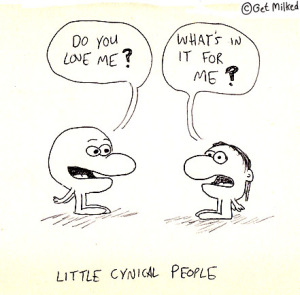 My recent serialised post titled “Your Money or your Life!” proposed that every ‘large corporate’* should make a meaningful change…that would be for the good of all.
My recent serialised post titled “Your Money or your Life!” proposed that every ‘large corporate’* should make a meaningful change…that would be for the good of all.
Wow, that would be great!
* Where ‘large corporate’ is short form for ‘controlled by free-floating short-term thinking shareholders’.
I got thinking (as is often the case after pressing the ‘publish’ button) about readers thinking:
“Erm, okay – interesting perspective – but why is the suggested change supposedly so profound?”
…and this caused me to question whether I had got the ‘this is a potential game changer!’ point across.
Note: What follows is relevant when considering ANY proposed change, not just the contents of my last post!
And so to a ‘systems thinking’ explanation:
First, a definition:
“A system is an interconnected set of elements that is coherently organised in a way that achieves something.
If you look at that definition closely for a minute, you can see that a system must consist of three kinds of things: elements, interconnections, and a function or purpose1.” (Donella Meadows)
Going back to an organisation (yours, mine,…wherever) as a system to ponder:
- The Elements are pretty obvious – they include the people, the products and services offered, the physical buildings and resources, lots of intangible pieces (distinct departments, teams within) and so on…;
- The Interconnections are the “the relationships that hold the elements together” e. g. the physical flows of work, the business policies and guidelines, external laws and regulations, the communications (including the gossip!), and flows of information (signals that go to decision or action points…which may or may not trigger reactions);
- The Purpose of a system, whilst essential, is often hard to see (even if you think you know what it is!):
“The best way to deduce the system’s purpose is to watch for a while to see how the system behaves…Purposes are deduced from behaviour, not from rhetoric or stated goals.”
What you see may be very different to what you are told.
…and so, if you want to change an organisational system, presumably through a desire to improve (and even transform) it, then you have three “kinds of things” to play with.
Taking each ‘kind of thing’ in turn:
Elements
“Changing elements usually has the least effect on the system.”
Using rugby and the All Blacks to illustrate the point: The coaches can change one or two players but, if they keep everything else the same, then not too much will change.
Now, sure, some elements may be very important (perhaps the introduction of a brilliant goal kicker) but, even then, the worth of such a change is hugely constrained by the rest of the system.
You might change ALL the elements (e.g. players) but if you keep the interconnections (such as the game plan, methods of communication, information sharing, the environment of trust and respect…) and purpose the same, then very little change may occur.
 A positive example of this phenomenon: The All Blacks won the rugby World Cup in 2011 and 2015, making them the first team ever to achieve ‘back-to-back’ rugby World Cups. They did this with a core of extremely influential world-class players3…who then promptly retired!
A positive example of this phenomenon: The All Blacks won the rugby World Cup in 2011 and 2015, making them the first team ever to achieve ‘back-to-back’ rugby World Cups. They did this with a core of extremely influential world-class players3…who then promptly retired!
The world rugby media wondered how the All Blacks would rebuild, given the apparently gaping holes these players would leave. Many a pundit envisioned dark days ahead.
And yet a few weeks ago (on 22nd Oct 2016), despite introducing many new players, the All Blacks broke the world record for the number of consecutive international games won against ‘Tier one’ rugby nations (18 games). In short, rather than going backwards, they have ‘kicked on’ to even higher levels.
Their purpose and interconnections have clearly been shown to be stronger than the elements (e.g. players).
To the world of work: and organisational ‘restructures’. If you re-jig your hierarchical structure, changing the departments and faces within, but keep the methods of interconnection (the management system) and the underlying purpose the same (whether profit or political ideology), then not much has really changed.
“A system generally goes on being itself, changing only slowly if at all, even with complete substitution of its elements – as long as its interconnections and purposes remain intact.”
Further, you may have convinced yourself that your problems were ‘because of’ individuals…but consider that you may have ‘cut out’ the symptom and not the cause. If you don’t learn from this then you can expect another (costly) restructure in maybe 12 months time…and again…and again.
Interconnections
“Changing interconnections in a system can change it dramatically.”
 So, staying with rugby, let’s move to the English national team. In contrast to the All Blacks, they have had two terrible World Cups.
So, staying with rugby, let’s move to the English national team. In contrast to the All Blacks, they have had two terrible World Cups.
In 2011: they travelled to New Zealand and were awful (I know – I watched them!) They were heavily criticised for their attitude, and off field behaviour – they acted as if they were on an all expenses paid holiday…and, in the end, they were! The coach (Martin Johnson) resigned.
In 2015: they had home advantage – hopes were high. The whole of England was supporting them…but they exited the competition at the pool stages – the first time in their history. The coach (Stuart Lancaster) resigned.
So how has 2016 gone? Well, they’ve played 9, won 9…which includes:
- achieving the Grand Slam (which they haven’t done for 13 years);
- a 3-0 tour whitewash of Australia (a rare achievement); and
- rising to be ranked 2nd in the World (from 8th)…just behind those mighty All Blacks.
So what’s changed? Well, England appointed a new manager (Eddie Jones)…but he has stuck with the core of previous players (those elements).
Instead of wholesale changing of the elements, he’s changed the interconnections – how they work together – resulting in players that had become labelled as ‘bad boys’, ‘past their best’ and ‘donkeys’4 being reborn, putting in controlled, consistent and herculean performances.
We don’t yet know whether the change will be long lasting…but it has most definitely been profound.
Back to the world of work: Perhaps the best known modern(ish) example of keeping the elements but changing the interconnections has to be NUMMI:
General Motor’s Fremont car plant was one of the worst performing plants in the whole industry, with high costs, low quality and terrible worker relations. GM closed the plant in 1982.
Toyota, wanting to start production in America, struck a joint-venture agreement with GM and the Fremont plant reopened as NUMMI in 1985. They rehired 85% of the original workforce (who still belonged to the Union – considered by GM as a serious problem). After taking 100s of the workers over to Japan to experience totally different thinking (involving a high degree of meaningful worker interacting), these learning’s were put into practise and the factory went on to produce the lowest cost, highest quality cars within its first year!
“Toyota took a bunch of [apparent] F Players, retrained them, put them into a great system, and magically they became superstars.” (Pfeffer and Sutton)
In short: Changing from a command-and-control management system to one that better understands systems and people will be dramatic.
Purpose
“A change in purpose changes a system profoundly, even if every element and interconnection remains the same.”
So, to switch from rugby to football: There’s an annual knockout competition in English Football, known as ‘The FA cup’. First played in 1871, it is the oldest football competition in the world. There is something rather magical about it because, given that it is open to any eligible club down to level 10 of the English football league system, it allows amateur minnows to mix it with the millionaire mega-stars…and, every now and then, create an upset – a minnow becomes a giant killer!
I searched for a game between a low-league minnow and a 1st division giant…and came up with Wrexham vs. Arsenal back in 19925. Both appeared to have had the same purpose – to win the game – but I suggest that their true purposes were rather different (and not so obviously stated).
Arsenal’s stars were probably trying to keep themselves injury free, to focus on other important matters – win their league (the 1st division) and perhaps get into their respective national sides (it was European Cup year)….and maybe avoid the embarrassment of defeat.

In contrast, every man in the Wrexham team was aiming to become a legend!
Wrexham won 2 – 1. The crowd went nuts!
But here’s an interesting point: Wrexham, the giant killing minnow, went back to their low-league competition the following weekend and drew 0 – 0 at home with Maidstone United. Maidstone who? Exactly! The same players and staff, same coaching system, same methods of communications…different purpose!
This example, I hope, serves to illustrate the point that a (true) change in purpose will be profound, even whilst retaining the same elements and interconnections.
To the world of work: Even better than a transient change in purpose (like Wrexham’s), would be a permanent one!
…and so we finally come to that ‘profound point’ from my recent serialised post: long-term profit sharing. Bringing ‘Live Money’ into an organisation permanently changes its purpose, for the good of all…which would lead to experimentation with new interconnections…which would reinvigorate the elements (or at least naturally sort through those that fit vs. those that wish to pursue something else).
All in all – a profound change to the system. It would be…well…‘Transformed’.
To close: So, what if your ‘leader‘ changes?
Let’s say your organisation hires a new CEO – an element, but a central one. Everyone’s chattering about this ‘big change’…but will it change much?
The answer is “it depends”.
It will depend upon whether the leader understands systems and people (through education and experience, or perhaps instinctively)…because:
- if the new leader goes on to change interconnections and, even better, the (actual) purpose then transformational change will likely occur; but
- if that leaders attempts change merely through changing the elements (new people, new departments, a new IT system, some new products and brands….) then not much will actually change.
Changing the interconnections relates to the management system.
Changing the purpose relates to why the organisation exists, and for whom.
…and I hope I don’t need to say that a fancy new ‘purpose statement’ doesn’t, of itself, change a thing!
Footnote:
1. The word ‘Function’ is generally used for non-human systems and ‘Purpose’ for human systems.
2. Quote source: All quotes (unless otherwise stated) are taken from the excellent book ‘Thinking in Systems’ written by the late Donella Meadows (a giant to add at some point).
3. All Black players that retired after 2015 rugby World Cup:
- Richie McCaw (148 caps): Regarded by many as the greatest ever rugby player, Most capped rugby player of all time, 3x World Rugby Player of the Year….and his accolades go on and on;
- Dan Carter (112 caps): Regarded by many as the greatest ever no. 10 (fly half) player, Highest international test points scorer of all time (1,598), 3x World Rugby Player of the Year…and on and on;
- Ma’a Nonu (103 caps) and Conrad Smith (94 caps). Most successful mid-field pairing;
- …and other great players: Kevin Mealamu (132 caps), Tony Woodcock (118 caps)
4. England players: If you are a rugby fan then I’m referring to the likes of Dylan Hartley (‘bad boy’), Chris Robshaw (‘has been’) and James Haskell (‘donkey’). Sorry chaps…but this is what you had seemingly become!
5. FA Cup Giant Killing Context: Wrexham came last in League 4 the year before (i.e. came 92nd out of all the 92 league 1 – 4 clubs). At the complete opposite end of the spectrum, Arsenal won League 1 (i.e. came 1st out of these 92 clubs).
6. Explaining the main post Image: The system is made up of ropes (elements), knots (interconnections) and purpose (what it is intended to achieve)….which may be to look pretty or to hold a heavy load.
7. Clarification: This post is NOT saying that purpose is the only lever you should focus on. It is merely explaining the likely impact of working on each type of lever. We should be working on improving all three ‘kinds of things’ and, being a system, they are all related!
 If you are a systems thinking ‘Deming disciple’ working in Command-and-Control land then your constant expressing of (what many of your ‘leaders’ think of as) unconventional thinking may get you a bad name!
If you are a systems thinking ‘Deming disciple’ working in Command-and-Control land then your constant expressing of (what many of your ‘leaders’ think of as) unconventional thinking may get you a bad name! Okay, you cynic….but are you?
Okay, you cynic….but are you? Erm, I’ll have to think about that one…
Erm, I’ll have to think about that one… Let me critique that label for a moment…
Let me critique that label for a moment… 4. “Passionate: Having, showing, or caused by strong feelings or beliefs”
4. “Passionate: Having, showing, or caused by strong feelings or beliefs” Oh yes, once my colleague and I thought we had finished our ‘labelling’ journey, we realised that nothing had actually changed. And so we turn to:
Oh yes, once my colleague and I thought we had finished our ‘labelling’ journey, we realised that nothing had actually changed. And so we turn to:
 My recent serialised post titled
My recent serialised post titled  A positive example of this phenomenon: The All Blacks won the rugby World Cup in 2011 and 2015, making them the first team ever to achieve ‘back-to-back’ rugby World Cups. They did this with a core of extremely influential world-class players3…who then promptly retired!
A positive example of this phenomenon: The All Blacks won the rugby World Cup in 2011 and 2015, making them the first team ever to achieve ‘back-to-back’ rugby World Cups. They did this with a core of extremely influential world-class players3…who then promptly retired! So, staying with rugby, let’s move to the English national team. In contrast to the All Blacks, they have had two terrible World Cups.
So, staying with rugby, let’s move to the English national team. In contrast to the All Blacks, they have had two terrible World Cups.